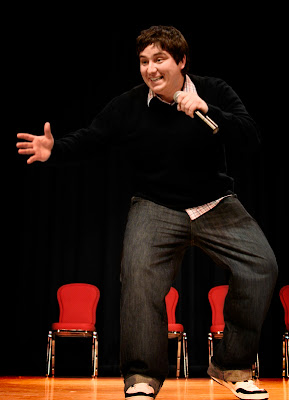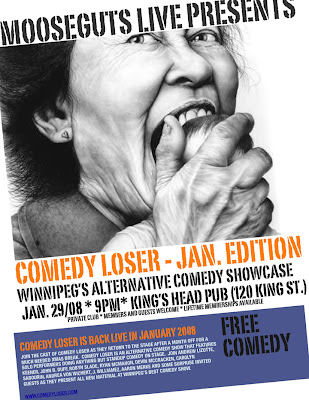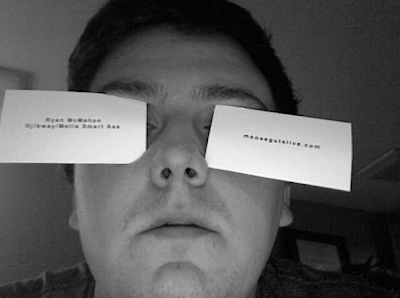 1) What the fuck is going on?
1) What the fuck is going on?
Not too fucking much, you?
2) How have you developed as an Artisitic Director since starting MooseGuts Theatre in 2003?
I think my vision is very different than it was. I started the company five years ago, with the dream of producing ‘ground breaking spectacle theatre’ that featured Native performers, directors, technicians, etc. That vision changed to wanting to do guerrilla theatre/performance art so that I could show ‘the man’ exactly what I thought of him. Right now the vision sits somewhere in between. Right now MooseGuts Theatre Company is more of a production company than anything. MGT is just me right now. I have chosen to not register as a non-profit, and I am going to go with more of a traditional business model for the company.
When I open my doors to the MGT Company’s home, it will be a black box space with workshop/rehearsal space, an office, and working bathrooms. I want MGT to more about the work than the space. I don’t want to be a landlord to my own company, I want to be an artist. So, for now, MGT is all about the youth training I do, the small, local comedy shows I put on, and the writing/performance I do. The vision is very fluid and will always change – I think.
3) What is Improv Boot Camp?
The IBC is a model for Oshki-Biimaataziwin (the Good Life). The Improv Boot Camp is a training program that I have worked on for a number of years to empower, challenge, and engage youth in their communities. When I graduated from theatre school I started teaching youth theatre workshops around the Toronto area and more often than not they would be an afternoon long, or at best, a day long and that was simply not enough time to work with the kids. Couple that with my utter distain of our “Indian Celebrities” that charge communities huge cash for “empowerment and leadership” workshops and I knew that I had to develop something that could and would make a difference in young peoples lives.
The workshop itself is a mixture of Augusto Boal, Viola Spolin, Keith Johnstone, and generic theatre school exercises mixed with Anishinaabe cultural teachings and world views, Anishinaabe singing and dancing teachings, and a deeper look at how young people impact their communities. The IBC is all about re-connecting youth with their communities in a real, tangible way by using theatre as empowerment.
4) How would you characterize Winnipeg’s theatre scene?
Safe. Grossly safe – if grossly safe is even a real term used by humans.
5) How does your background in standup comedy inform your approach to making theatre?
I think it’s the other way around for me – my background in theatre informs the way I approach doing comedy. I’ve only been doing standup comedy for two years and in that two years I’ve achieved some amazing things. People in Winnipeg see me as a ‘guy just starting out doing standup’ and not a lot of people here in Winnipeg realize that I’ve been working as an actor/director/writer/improviser/sketch performer for 10 years now. People see me as a ‘comedian’ now because I get so much work doing comedy, whether performing or writing, but I’ve trained in theatre for a long time and that truly is where my heart is.
I still write plays, read plays for people, dramaturge, etc. but I’m not out there chasing theatre work. When I was in Toronto auditioning for stuff, chasing whatever my agent sent me, I was never brown enough for casting people, and never white enough for casting people. I vowed early not be ‘the Indian’ and so I stopped caring about ‘being an actor’. I was always writing, so, it was a natural thing to start producing my own shows, speaking with my own voice on stage, and essentially begin my path of being more of an ‘alternative theatre/comedy/performance artist guy’ rather than try to fit into a mold I simply couldn’t fit in.
My performance goal is to examine and deconstruct everything that pisses me off, write some funny shit about it that doesn’t come off as vitriol, and somehow add some multimedia elements to it (puppets, video, masks, sound, movement, etc.). People see me as an alternative comic because I treat my act as theatre in terms of how I present the shit I write/perform, and to me, it’s all part of the same thing – letting the shit out of my head.
 6) From your experience working with First Nations Elders, have you noticed anything particular about they way they approach comedy?
6) From your experience working with First Nations Elders, have you noticed anything particular about they way they approach comedy?
Honestly that changes in every community. Some people believe you shouldn’t tell stories in the summer (traditionally a time for work), so they refuse to hire a comedian (storyteller) for their events. It is different everywhere. A lot of the people I run into on my travels tell me how refreshing it is to hear from “my generation” in a funny way.
In general, there are 10 working Native Comedians in North America. Native Comedy is not even in its infancy yet, and that is very clear to me based on reactions/responses I get after I do my act. One young guy in Alberta told me I was like the “Indian Chris Rock” and I guess I was flattered. My elders have always told me to be myself, to not lie. It’s my personal belief that that is where comedy comes from – truth. There are still a lot of taboo things that we, as Native Peoples, don’t talk about. Those are things I take aim at right away. NOT JUST to talk about them, but, to show our old people that we’re going to be okay. I want them to believe that, to know that, and to trust that.
In general, Native people love to laugh – laughter is medicine is an old cliche thrown around the teepee a lot, so, more often than not, the places I play too have already been sharing food, company, and laughter before I even step on stage. It is hard for me though, obviously looking at me – I look more cowboy than Indian. The first 10 minutes of my act is getting them to believe I’m an Indian. When I do mainstream shows, I have to do an entirely different act – I’m too white to be their Indian, and too brown to be their funny white man. I’ve learned that I need to be funny no matter who I’m playing for.
7) What’s funny?
The truth.
8) How much of your work is informed by a sense of anger?
All of it. Every last consonant and mother-fucking vowel bleeds anger. Every shitty fucking sound cue and half-assed piece of shit lighting change in my shows are chosen while very angry. All the fucking posters and handbills and shitty little websites I make on my stupid fucking MacBook are all pieces of shit but apparently necessary to promote the dumb fucking shows I have chosen to . . .
 9) What is your fondest memory of being on stage?
9) What is your fondest memory of being on stage?
My favourite memory of being onstage would have to be bombing at the Upright Citizens Brigade Theatre in New York City during the Del Close Marathon in 2003. The marathon itself is the ‘big show’ of improv and I was there with my troupe, Tonto’s Nephews.
Leading up to the festival we had been getting some interest from CBC and the Winnipeg Comedy Festival, as well as some other television development stuff. The fact that we were an all-Aboriginal Comedy Troupe was appealing apparently and there had been talk that some NBC Diversity people were going to be watching us at the festival to see what the hype was about.
To make a very long, boring story short, we went and we sucked. We had an amazing time slot, the theatre was full,
half of the cast of
Saturday Night Live.”
and in the first row of the audience sat half of the cast of Saturday Night Live. We went out there and made ourselves look like fools. No one was listening onstage, two of our ‘stars’ bullied and trudged their way through their storylines, and the whole show crumbled – it was 30 minutes of shitty improv. I don’t even remember if we got any laughs.
When I got off the stage, I went straight to the back of the room, and by chance I ran into Horatio Sanz. He knew I was steaming mad about being bullied off stage during the improv set and he pulled me aside and for about an hour he told my what he liked about my style, we talked improv and where it’s going, and we teased a bunch of drunk UCB ‘chicks’, or, ‘groupies’, and it was an incredible time.
Sucking that badly onstage at such a huge comedy festival was a humbling performance moment for me. Everything I had worked for to get to that day exploded in my face. After I left the theatre I went for a walk to Central Park, sat under a tree, and started to think about what would become MooseGuts Theatre.
10) Any tips for non-comedians on how to be funnier, generally?
My general advice is to not be funny. Some of my best comedy coaches/directors have told me time and time again when you try to be funny, you’re probably going for a gag (cheap joke/laugh) and when going for the gag you take yourself out of the scene, or the moment. A lot of players/actors that don’t know what improv/sketch/standup is about – their instincts immediately take them to the gag. However, an attentive audience is usually in the moment as well, so when a player goes for the gag – the audience should either groan loudly at you or throw shit at you. It’s cheap.
The best way to get laughs (if that is your goal) is to be yourself. Stay open physically (body and voice), spiritually, and emotionally and your truth will always come out on stage. Truth in comedy, follow the fear because that is where the laughs are.
Ryan –
I love how you found your fondest on-stage moment in your darkest on-stage moment.
“Follow the fear.”
Awesome.
I must be honest – answering these questions really brought some things “into the light” for me.
Sadly, I must say that failing on stage at this festival taught me more about myself, the work, and comedy in general than any other show or project that I’ve ever done. I will say – I have succeeded and had wildly successful runs of shows, amazing ‘lightbulb moments’ onstage, and I’ve been blessed to have worked with amazing people.
Thanks again.
“7) What’s funny?
The truth.”
Yep. Not just stranger than fiction, also funnier.
Thanks for the awesome interview dude.
heya ryan,
we’ve met only via telephone, about the time you were moving, (i used to work at native earth in TO) i do believe. delighted to see it’s going swimmingly for you.
aaand, i triple scoople double dog dare you to name the ten working native comedians at present.
you biting?
-tb
hi tara
don kelly
don burnstick
gerry barrett
charlie hill
james and ernie
jim ruel
craig lauzon
mark yaffee
drew lacapa
myself
there are a handful of ‘other’ performers that do some form of comedy, and i’d consider them to be more on the side of theatre practitioners (herbie, michaela, darrell).
I suppose I could/should be more clear about what I mean by ‘comedians’. The term ‘comedian’, as I’ve used it in the interview, refers to those with an act, the do either mainstream club dates, or, travel with their ‘act’ and do shows in communities, bingo halls, casino’s, old folks homes, etc.
Ryan,
I suppose that with any list there are going to be exclusions and qualifications required. To me, this list seems like a great talking point. And, to the uninitiated outsider at least, your definition of “comedian” appears sound.
How do you feel about the fact that there are no women on the list? Does this speak to a trend within standup? Or something else?
And in looking at the 10 names on that list, do you see anything that’s common to these comedians aside from them all being members of First Nations communities?
Tara? Thoughts?
Ian
Good questions Ian.
I think the fact there aren’t any women on the list speaks to the reality of comedy – few women ‘make’ it in comedy because it’s an ‘Old White Boys Club’.
Looking at the roots of comedy, one will find that women were not often seen as funny. Looking back at film in the 30’s, 40’s, and 50’s very few women were comedians, they were the love interests in movies. Carol Burnett and Lucille Ball have spoken out on the topic widely, but even at the height of their shows, men ran the ship. Whether it was in terms of final drafts of scripts, directing of stories and scenes, or marketing the show – the women’s roles are after thoughts.
While at Second City, alot was made of the fact that I was on scholarship through the Toronto Theatre Association Cross Cultural Scholarship agreement that they have/had with Second City. Many a late night was shared with other improvisers/sketch people talking about Visible Minorities in comedy, women in comedy, GLBT in comedy. One of the more frustrating things about being around Second City was seeing a new cast go up and realizing that the casting was being done through labels – the new fat guy, the neurotic woman, the person of colour, etc. Look at any mainstream show – SNL, Mad TV, Comedy Inc., it’s the reality of comedy.
I auditioned for CBC in Toronto and I guess the guy wanted me to, “…be more Indian…” and that was the last time I hoped for mainstream comedy success. I just want to do my work and be left alone – if success finds me it’ll be because people “get it.” That’s all I can hope for.
I am happy to report that there are some things happening on this front. There is a small festival being talked about in San Fransisco that features Minorities in Comedy. When I heard that I called down there and shared my festival business plan with them – sent it to them for free. I’ve had a business plan/proposal together for years now for a festival called “COMEDY IN ‘A’ MINOR – A MARGINALLY FUNNY COMEDY FESTIVAL”. All people are funny, and all people need to represent themselves.
I am particularly concerned with the lack of women on the list of active comedians. Michaela Washburn is a wildly talented writer/actor that was doing some standup, but I understand she’s doing great things in theatre lately. Also, Dawn Dumont started doing standup a couple of years ago and I understand she was doing some great things in New York City. For me, The Turtle Gals are really pushing comedic boundaries with there last show, “The Only Good Indian”, and to me, what they do is amongst the funniest, smartest, socio-politcal statements I’ve ever seen made onstage.
I hope there are dozens of Native people that I’ve missed, haven’t heard of, etc. That would be a real relief.
In general though, as I stated in the interview, Native Comedians are now JUST breaking into the mainstream scene. Charlie Hill, who, really broke through in the ’70’s while doing Carson and later being one of the head writers for Roseanne, rarely does comedy club appearences or festivals. Having only ever talked to him a handful of times and not really having the chance to get into great depth with him on the topic, he’s reached an age that Comedy Central or the Comedy Network won’t look at. He does tour with George Lopez and he is a huge name in the US. I read an interview that featured George Lopez and he said that Charlie was easily among the top 10 funny people he’d ever seen and parallels were drawn between Pryor and Charlie Hill. It doesn’t get bigger than that.
This conversation is awesome. I can tell you guys that the wildly talented Michaela Washburn is in fact still doing great things in theatre, as she is rehearsing a show in a studio 10 feet from this computer.
Strangely enough, my roommate and I were just talking about the lack of women in comedy in general. We concluded the comedy world needed a female Chris Farley.
Since this conversation has veered this way, let me direct you to a website that I frequent:
http://www.theblackcomedyproject.com
There is some powerful insight into the world of comedy here.
Cool website. Tons of content. Thanks Ryan.
I’m flattered to be on any list with Charlie Hill anytime…for anything. Even if it was a police line up. But to be honest I don’t really consider myself a comic(insert Air Farce Joke here). I’ve always done sketch and character monologues and I guess that has always made me feel more like an actor with a comedic performance element to what I do. I’ve never done stand up and in fact it scares the shit out of me. Thanks for the inclusion but you should probably replace me with Howie Miller he’s a seasoned working comic formerly of Yuks before the mass western exodus. http://www.howiemiller.com